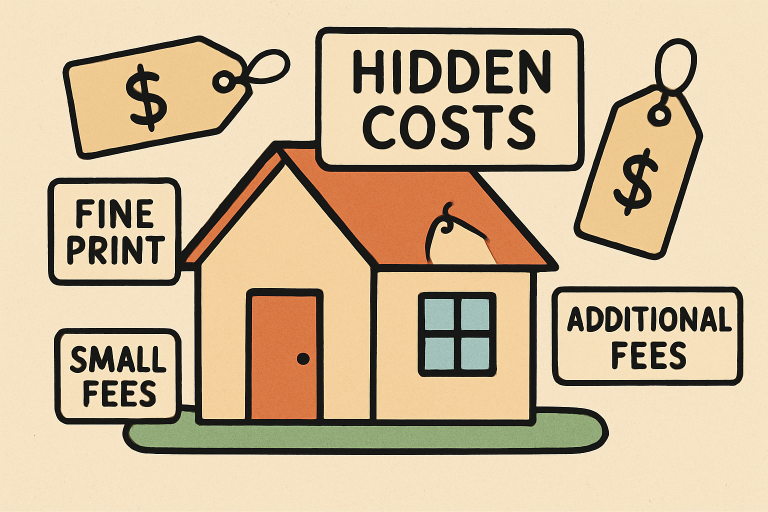Table of Contents
Understanding Real Estate Agent Fees
Hiring a real estate agent can streamline the home buying or selling process, but it’s vital to recognize all the costs involved—from upfront commissions to the less obvious fees that sometimes catch consumers off guard. While the commission is usually the most significant cost, cashed out as a percentage of the sale price, you may face additional fees that can significantly impact your closing budget. Many home buyers and sellers in North Carolina turn to Raleigh NC real estate experts DeRonja Real Estate for guidance on navigating these costs while ensuring a smooth transaction experience.
When budgeting for your move, it’s essential to account for all line items, not just the agent’s commission. Some costs are tied directly to selling strategies, while others are administrative or related to the property’s condition. Knowing what to look for minimizes last-minute surprises and helps you make smarter choices about which services to pay for and which to avoid.
Common Hidden Costs to Watch For
Real estate agencies may structure their fees differently, but some hidden expenses come up repeatedly. Being aware of these possible charges means you can ask about them upfront and plan accordingly:
- Marketing Expenses: To reach more buyers, agents may recommend extras such as professional photography, 3D tours, staging, paid social media ads, or enhanced listings on portals. While effective, these can add $1,000 or more to your closing statement and are sometimes only partially included in your agent’s standard service.
- Administrative Fees: Beyond commission, many brokerages add document or transaction fees to cover paperwork handling and coordination. These can range from $200 to $600 or higher. Sometimes, they appear as “broker service fees” or “compliance charges,” so always check your contract for specifics.
- Repair Costs: Home inspections often reveal repairs or improvements that buyers request before closing. Fixing major items—such as roofs or HVAC systems—can add thousands to your out-of-pocket expenses and sometimes fall to the seller if not negotiated carefully.
Some agencies offer bundled packages but may charge extra for premium services, so don’t hesitate to ask what’s included versus what could be unexpectedly billed later. According to a recent article from Bankrate, many sellers are surprised by the out-of-pocket expenses that emerge after accounts have been set up and deals negotiated.

Recent Changes in Commission Structures
The real estate industry is in flux, especially following a landmark $418 million settlement by the National Association of Realtors. Commission structures were previously more rigid, but new rules announced in 2024 eased those restrictions, giving both buyers and sellers more power to negotiate agent compensation. Today, clients are not automatically bound by preset commissions and can decide on a fee arrangement—be it a percentage, flat fee, or hourly rate.
The settlement means buyers often need to negotiate agent fees separately, rather than relying on sellers to pay commissions from their proceeds. This can potentially lower rates industry-wide and foster more transparency, but it places greater responsibility on consumers to understand and advocate for fair pricing. For those who want more insight, CNBC offers an in-depth look at the origins and implications of these changes.
Negotiating Agent Fees
Now that buyers and sellers must decide how much they will pay, understanding negotiation tactics is more important than ever. Agents might be open to non-traditional fee models or rebate structures, especially for higher-value transactions or competitive local market conditions. Rather than simply accepting the standard commission percentage, discuss alternative structures:
- Ask for a breakdown of what services each fee covers and which services may cost extra.
- Consider whether paying a higher fee results in higher-touch service and a better overall sales price.
- If you’re buying, check if your agent is willing to credit back part of their fee at closing—some agents use this strategy to win client loyalty in crowded markets.
Remember, if a fee feels non-negotiable, it’s wise to consider a different agent. With the new rules, consumers have more leverage and options than ever in fee discussions. For details on navigating this new landscape, see this CNBC overview.
Tips to Avoid Hidden Costs
- Request a Detailed Estimate: Don’t hesitate to ask your agent or broker for a breakdown of every potential cost of your sale or purchase, including extras.
- Review Contracts Carefully: Review every line in your agreement, ensuring you understand which charges are set in stone and which may be added as your transaction unfolds.
- Compare Multiple Agents: Interviewing a handful of agents gives you a strong sense of what’s standard in your local area, and what’s negotiable. Don’t settle for the first estimate; market forces are now more in your favor.
- Negotiate Fees: Take advantage of the recent industry shakeup to discuss rates, fee structures, and service levels openly before you sign.
Conclusion
Today’s real estate landscape is more transparent than ever—but that also means consumers must be more proactive about understanding and negotiating the full range of costs. By educating yourself about commission trends, questioning what’s included in your agent’s fee, and getting everything in writing, you’ll avoid the unpleasant surprise of hidden expenses at closing. Open communication, thoughtful comparisons, and negotiating in your best interest can safeguard your finances while ensuring your transaction is handled by a true professional.


